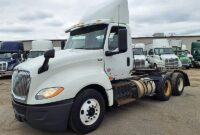U-Haul Trailer Prices: Your Comprehensive Guide to Affordable Moving Solutions cars.truckstrend.com
Moving, transporting goods, or hauling a vehicle often comes with the challenge of finding cost-effective and reliable solutions. Among the myriad options available, U-Haul trailers stand out as a popular choice for their accessibility, variety, and relative affordability. Understanding U-Haul trailer prices is crucial for anyone planning a DIY move or a hauling project, as these costs can significantly impact your overall budget. This comprehensive guide will break down the intricacies of U-Haul trailer pricing, helping you navigate the options and make an informed decision for your specific needs.
U-Haul’s business model revolves around providing flexible rental solutions, and their trailer offerings are no exception. From compact utility trailers perfect for yard work to large enclosed cargo trailers designed for household moves, and specialized car haulers, U-Haul offers a diverse fleet. The price of renting one of these trailers isn’t a flat fee; it’s a dynamic figure influenced by several key factors including the trailer type, size, rental duration, pickup and drop-off locations, and even the time of year. By understanding these variables, you can accurately estimate your expenses and avoid any surprises.
U-Haul Trailer Prices: Your Comprehensive Guide to Affordable Moving Solutions
Understanding U-Haul Trailer Pricing Dynamics
The cost of renting a U-Haul trailer is not a fixed sum but rather a calculation based on several intertwined factors. Grasping these dynamics is the first step toward securing the best possible rate for your hauling needs.
- Trailer Type and Size: This is the most significant determinant. Larger trailers and specialized equipment like car haulers naturally command higher prices than smaller utility trailers. Within each category, larger sizes will also cost more.
- Rental Duration: U-Haul primarily operates on a daily rental basis for in-town moves. For one-way rentals, the price quoted typically covers a set number of days, with penalties for late returns. Longer rentals might sometimes qualify for slight discounts, but generally, each additional day adds to the cost.
- One-Way vs. In-Town Rental: This is a critical distinction affecting U-Haul trailer prices.
- In-Town Rental: You pick up and return the trailer to the same U-Haul location. These are generally much cheaper, often having flat daily rates.
- One-Way Rental: You pick up the trailer at one location and drop it off at a different one. Prices for one-way rentals are significantly higher and are dynamically calculated based on distance, demand, and the availability of trailers at both the origin and destination points. They are designed to balance U-Haul’s fleet distribution.

- Location and Demand: Prices can vary by city and even by specific U-Haul dealer. High-demand areas or times (e.g., major metropolitan areas, weekends, end-of-month, summer) can see elevated prices due to limited availability.
- Time of Year: Peak moving seasons, particularly summer months (May to September) and holiday periods, generally lead to higher prices due to increased demand. Booking during off-peak times can sometimes result in savings.
- Optional Add-ons: While not part of the base trailer price, opting for Safemove® or Safemove Plus® insurance, or renting moving supplies (dollies, blankets) will add to your total cost.
Types of U-Haul Trailers and Their Typical Price Ranges
U-Haul categorizes its trailers into three main types, each serving different purposes and coming with its own price structure.
1. Utility Trailers (Open Trailers)
Utility trailers are open-top trailers designed for hauling items that don’t require protection from the elements, such as landscaping materials, construction debris, ATVs, or oddly shaped furniture. They feature low sides and a ramp for easy loading.
- Sizes Available: 4’x7′, 5’x8′, 5’x10′, 6’x12′.
- Typical Use: Yard work, transporting large appliances, small construction materials, motorcycles, or ATVs.
- In-Town Daily Price Range: Approximately $14.95 – $39.95. The 4’x7′ is typically the cheapest, with the 6’x12′ being the most expensive in this category.
- One-Way Pricing: One-way options for utility trailers are less common and, when available, are typically much higher, starting from $100+ for short distances and increasing significantly for longer hauls, often ranging from $200-$500+ depending on distance and demand.
2. Cargo Trailers (Enclosed Trailers)
Cargo trailers are fully enclosed, providing protection for your belongings from weather, road debris, and theft. They are ideal for moving household goods, furniture, and valuables.
- Sizes Available: 4’x8′, 5’x8′, 5’x10′, 6’x12′.
- Typical Use: Moving furniture, boxes, appliances, sensitive equipment, or anything needing protection from the elements.
- In-Town Daily Price Range: Approximately $18.95 – $49.95. The 4’x8′ is usually the most economical, while the 6’x12′ is the largest and most expensive.
- One-Way Pricing: Similar to utility trailers, one-way cargo trailer rentals are dynamically priced. They can range from $150 – $800+ depending on the size, distance, and demand. The 6’x12′ cargo trailer is one of the most popular for one-way moves and can be quite expensive.
3. Car Haulers (Auto Transports & Tow Dollies)
These specialized trailers are designed specifically for transporting vehicles.
- Tow Dolly: Lifts the front two wheels of the towed vehicle off the ground.
- Typical Use: Towing front-wheel-drive vehicles, or rear-wheel-drive vehicles with the drive shaft removed.
- In-Town Daily Price Range: Approximately $39.95 – $59.95.
- One-Way Pricing: Significantly higher than in-town, typically ranging from $100 – $400+, varying greatly by distance and demand.
- Auto Transport (Car Carrier): Lifts all four wheels of the towed vehicle off the ground, providing maximum protection.
- Typical Use: Towing any type of vehicle, especially valuable or classic cars, or vehicles with all-wheel drive.
- In-Town Daily Price Range: Approximately $59.95 – $89.95.
- One-Way Pricing: These are the most expensive trailers for one-way rentals, often ranging from $200 – $1,000+, depending heavily on distance and availability.
Practical Advice for Estimating and Securing Your U-Haul Trailer
Securing the right trailer at the right price requires a bit of planning and strategic booking.
How to Get an Accurate Quote
The most accurate way to determine U-Haul trailer prices for your specific needs is to use U-Haul’s official website. Their online reservation system allows you to input your desired pickup and drop-off locations, dates, and trailer type. The system will then generate a real-time quote, including all estimated fees and taxes. You can also call your local U-Haul dealer, but online quoting often provides more flexibility to compare options.
Booking Tips
- Book in Advance: Especially during peak moving seasons (summer, end-of-month, holidays), booking several weeks or even a month in advance can ensure availability and potentially lock in a better rate.
- Be Flexible with Dates: If your schedule allows, consider moving during weekdays or mid-month. Prices are often lower due to reduced demand.
- Check Multiple Pickup Locations: Sometimes, renting from a U-Haul dealer slightly outside a major city center can result in lower prices or better availability.
- Understand One-Way vs. In-Town: Clearly define your need. If you’re returning to the same location, an in-town rental is always more cost-effective. For cross-country moves, a one-way rental is unavoidable, so factor in the higher cost.
What to Consider Before Renting
Before you even look at prices, ensure you have the necessary equipment and capability:
- Towing Vehicle Capacity: Check your vehicle’s owner’s manual for its Gross Vehicle Weight Rating (GVWR) and Gross Combined Weight Rating (GCWR). U-Haul also has a "Towing Guide" on their website where you can input your vehicle make and model to see what it can safely tow.
- Hitch and Wiring: Your vehicle must have a properly installed hitch receiver, the correct ball mount and ball size for the trailer, and functioning electrical wiring for the trailer’s lights. U-Haul can install these for a fee if you don’t have them.
- Driver Comfort: Towing a trailer, especially a large one, requires different driving skills. Ensure you are comfortable and experienced with towing.
- Load Distribution: Proper loading is critical for safe towing. Always load heavier items towards the front of the trailer, over the axle, to maintain proper tongue weight.
Important Considerations Beyond the Base Price
While the base rental fee is the primary component of U-Haul trailer prices, several other factors can add to your total expenditure.
- Rental Duration and Late Fees: The quoted price for one-way rentals typically includes a specific number of rental days. Exceeding this period without prior arrangement can result in significant late fees. For in-town rentals, you are charged daily, so returning the trailer promptly is key.
- Insurance Options (Safemove® / Safemove Plus®):
- Safemove®: Covers damage to the U-Haul trailer, supplementary liability, and medical/life coverage.
- Safemove Plus®: Includes everything in Safemove® plus cargo coverage for your belongings.
- While not mandatory, these options are highly recommended as your personal auto insurance might not cover damage to a rented trailer or your cargo. Costs typically range from $8 – $25 per day, depending on the trailer type and coverage level.
- Taxes and Fees: Expect to pay local sales tax on your rental. Additionally, U-Haul often charges environmental fees or other small administrative fees. These are usually added at checkout.
- Equipment Add-ons: If you need moving blankets, hand trucks, furniture dollies, or other packing supplies, you can rent or purchase them from U-Haul. Factor these into your budget.
- Fuel Costs: Don’t forget the additional fuel your towing vehicle will consume. Towing a heavy trailer significantly reduces fuel efficiency, especially on long trips or in hilly terrain.
Estimated U-Haul Trailer Prices Table
Please note: These are estimated daily rates for in-town rentals. One-way rates are highly variable and are typically significantly higher, calculated based on distance, demand, and specific routes. Always obtain an official quote from U-Haul for precise pricing.
| Trailer Type | Size | In-Town Daily Rate (Estimate) | One-Way Daily Rate (Estimate – Variable) | Primary Use Case |
|---|---|---|---|---|
| Utility Trailers | 4’x7′ | $14.95 – $19.95 | $100 – $300+ | Small loads, yard work, ATVs, open-air transport |
| (Open) | 5’x8′ | $18.95 – $24.95 | $120 – $400+ | Slightly larger loads, furniture, motorcycles |
| 5’x10′ | $24.95 – $29.95 | $150 – $500+ | Medium loads, longer items | |
| 6’x12′ | $29.95 – $39.95 | $200 – $600+ | Large open loads, construction materials, major projects | |
| Cargo Trailers | 4’x8′ | $18.95 – $24.95 | $150 – $400+ | Small moves, protecting sensitive items |
| (Enclosed) | 5’x8′ | $24.95 – $34.95 | $200 – $500+ | Apartment moves, medium household goods |
| 5’x10′ | $29.95 – $39.95 | $250 – $650+ | 1-2 bedroom apartment moves, secure transport | |
| 6’x12′ | $34.95 – $49.95 | $300 – $800+ | 2-3 bedroom house moves, large secure transport | |
| Car Haulers | Tow Dolly | $39.95 – $59.95 | $100 – $400+ | Towing front-wheel-drive cars |
| Auto Transport | $59.95 – $89.95 | $200 – $1000+ | Towing all types of vehicles (all wheels off ground) |
Disclaimer: Prices are estimates and subject to change based on location, availability, demand, and specific rental details. One-way prices are highly dynamic and can vary significantly.
Concluding Summary
Understanding U-Haul trailer prices is more than just knowing a number; it’s about comprehending the value, flexibility, and potential costs associated with a DIY moving or hauling solution. U-Haul offers a diverse range of trailers, each designed for specific needs, making them an accessible and often cost-effective choice for many. By diligently researching trailer types, understanding the nuances of in-town vs. one-way rentals, factoring in additional costs like insurance and fuel, and booking strategically, you can optimize your rental experience. Empower yourself with knowledge and planning, and your U-Haul trailer rental will be a smooth, budget-friendly component of your next big project or move.
Frequently Asked Questions (FAQ) about U-Haul Trailer Prices
Q1: How do U-Haul trailer prices vary between different locations?
A1: Prices can vary significantly based on local demand, regional supply, and the cost of doing business in a particular area. For instance, renting a trailer in a densely populated metropolitan area might be more expensive than in a rural location due to higher demand. Always get a quote for your specific pickup and drop-off locations.
Q2: Is insurance mandatory when renting a U-Haul trailer?
A2: No, U-Haul’s Safemove® or Safemove Plus® insurance options are not mandatory. However, they are highly recommended. Your personal auto insurance policy may not cover damage to a rented trailer or the cargo inside, leaving you financially responsible for any incidents.
Q3: Can I rent a U-Haul trailer for just a few hours?
A3: While you can return the trailer early, U-Haul typically charges a flat daily rate for in-town rentals, regardless of how long you use it within that 24-hour period. One-way rentals are priced based on the route and duration, not hourly.
Q4: What’s the main difference in price between a U-Haul tow dolly and an auto transport?
A4: An auto transport (car carrier) is generally more expensive than a tow dolly. A tow dolly only lifts the front two wheels of the vehicle off the ground, while an auto transport lifts all four wheels, providing a more secure and stable transport, especially for longer distances or more valuable vehicles. The increased capacity and features of the auto transport contribute to its higher price.
Q5: How do I know if my vehicle can safely tow a U-Haul trailer?
A5: U-Haul has a comprehensive "Towing Guide" on their website where you can input your vehicle’s make, model, and year. It will then tell you which trailers your vehicle can safely tow, along with any necessary hitch requirements. Always consult your vehicle’s owner’s manual for its official towing capacity.
Q6: Are there any hidden fees when renting a U-Haul trailer?
A6: U-Haul aims to be transparent with its pricing. However, beyond the base rental rate, common additional costs can include sales tax, environmental fees, and optional insurance. For one-way rentals, exceeding the allowed mileage or days can incur additional charges. Late returns for in-town rentals will also result in additional daily charges. Always review your quote thoroughly before confirming.



